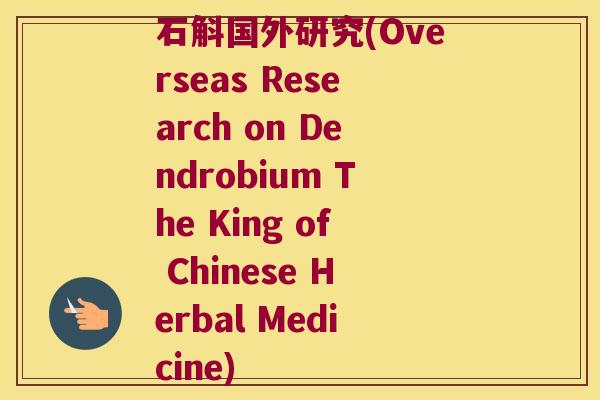生地沙参麦冬石斛成药(四种中药配方成品:生地沙参麦冬石斛制剂)
生地沙参麦冬石斛成药——古老的配方 是中华民族珍贵的文化遗产之一,生地沙参麦冬石斛成药是其中的一种著名的配方。该配方中的四种——...
扫一扫用手机浏览
Dendrobium is a genus of orchids that has a long history of medicinal use in Traditional Chinese Medicine (TCM). Among the different species of Dendrobium, Dendrobium nobile, commonly known as Shi Hu or Stone Flower, holds a special place as the "King of Chinese Herbal Medicine." In recent years, a growing number of overseas researchers have focused on exploring the medicinal properties of this plant and its potential applications in various fields.
The active compounds in Dendrobium nobile are mainly polysaccharides, alkaloids, flavonoids, and bibenzyls. Polysaccharides are the most abundant bioactive compounds and have been extensively studied for their immunomodulatory, antitumor, and anti-inflammatory effects. Alkaloids and flavonoids have also demonstrated anti-inflammatory and antioxidant properties, while bibenzyls exhibit antiviral and anti-fungal activities.
Dendrobium nobile has been traditionally used in TCM for its various health benefits, including improving digestion, promoting wound healing, and enhancing immune function. Modern research has confirmed these effects and also suggests potential applications in treating diabetes, cardiovascular diseases, and even cancer. Several studies have reported that Dendrobium nobile extracts can lower blood glucose levels, reduce blood lipids, and regulate blood pressure. Furthermore, its antioxidant and anti-inflammatory properties could help prevent or alleviate the progression of various chronic diseases.
Dendrobium nobile has gained popularity in the sports nutrition and performance industry as an alternative to stimulants like caffeine. It is believed to enhance energy, focus, and endurance, without the negative side effects associated with caffeine consumption. Recent studies have shown that Dendrobium nobile extracts can improve exercise performance and increase muscle mass in athletes. However, more research is needed to fully understand its mechanisms of action and potential long-term effects on the body.

Despite its potential benefits, the demand for Dendrobium nobile has put a strain on its natural populations and raised concerns about its sustainability. The wild populations of Dendrobium nobile have declined significantly due to overharvesting, climate change, and habitat loss. To meet the growing demand, commercial cultivation of Dendrobium nobile has become widespread in recent years. This approach has the potential to support the industry's needs while also protecting the wild populations. Nevertheless, sustainable cultivation and conservation measures must be implemented to ensure the long-term viability of the species.
As overseas research on Dendrobium nobile continues to expand, new insights into its medicinal properties and potential applications are emerging. The King of Chinese Herbal Medicine holds great promise for the treatment and prevention of various chronic diseases, as well as improving sports nutrition and performance. However, it is crucial to balance its commercial use with sustainable cultivation and conservation strategies to protect its natural populations and support a thriving industry.